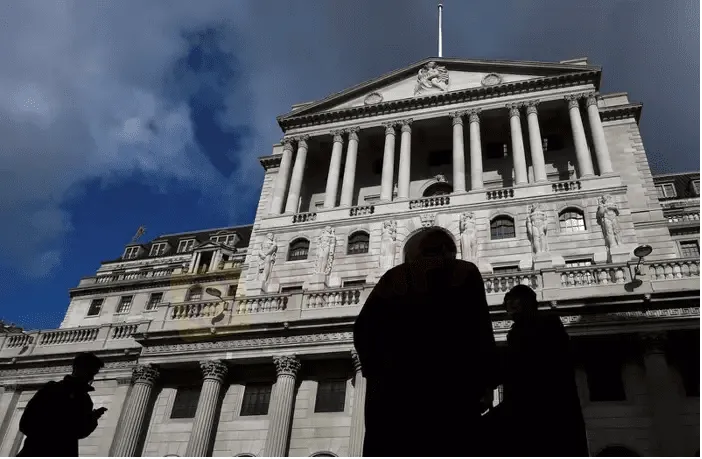简体中文
繁體中文
English
Pусский
日本語
ภาษาไทย
Tiếng Việt
Bahasa Indonesia
Español
हिन्दी
Filippiiniläinen
Français
Deutsch
Português
Türkçe
한국어
العربية
UK two-year gilt yields hit post-2008 high as inflation fears mount
Abstract:British short-dated government bond yields surged on Wednesday, hitting fresh 14-year highs as investors worried about surging energy prices and the knock-on effect for inflation and Bank of England interest rates.

Two-year gilt yields leapt as much as 24 basis points on the day to 2.959%, their highest since November 2008 when Britain was in the midst of the global financial crisis. At 1550 GMT they were trading at 2.94%.
Two-year yields, which are sensitive to the BoE rate outlook, have risen more than 50 basis points since data last week showed British consumer price inflation had hit double digits sooner than expected.
Gilts have also underperformed against U.S. and German debt, as investors judge the BoE will raise rates faster than the Federal Reserve and the European Central Bank.
The yield premium two-year gilts offer over German two-year bonds rose 15 basis points on Wednesday to just over 200 basis points, its widest since August 2005.
Investors were pricing the BoEs benchmark Bank Rate peaking at 4.5% in May 2023, more than double the current 1.75%, according to rate futures.
Imogen Bachra, fixed income strategist at NatWest Markets, said Wednesdays sell-off reflected ongoing concerns about inflation – and the likelihood of more government spending to offset soaring energy bills – rather than any new triggers.
Since the BoE raised rates by half a percentage point this month, its biggest hike since 1995, policymakers appeared more focused on keeping inflation expectations in check than staving off recession, she added.
“To the extent that significantly higher gas prices drive up inflation expectations, they drive up Bank Rate expectations as well,” she said.
Britains energy regulator is due to set out new maximum tariffs on Friday that are likely to cause household bills to almost double from October, and rise further in 2023.
Whoever succeeds Boris Johnson as prime minister is likely to have to announce emergency public spending measures to offset some of the rise, leading to greater debt issuance, Bachra said.
Longer-dated gilt yields were also up sharply. Five-year yields rose 20 basis points, 10-years by 12 basis points and 30-years by 5 basis points, pushing 5- and 30-year yields to their highest levels since 2011 and 2014 respectively.

Disclaimer:
The views in this article only represent the author's personal views, and do not constitute investment advice on this platform. This platform does not guarantee the accuracy, completeness and timeliness of the information in the article, and will not be liable for any loss caused by the use of or reliance on the information in the article.
Read more

The Ultimate Guide to Automated Forex Trading in 2025
Modern markets are revolutionized by automated trading systems, which now execute 70-85% of all transactions. These advanced automated trading software solutions, commonly called trading robots or Expert Advisors (EAs), leverage algorithmic precision for automatic trading across forex, stocks, and commodities 24/7. By removing emotional interference and executing trades in microseconds, auto forex trading platforms create fair opportunities for all market participants. For those new to automated trading for beginners, these systems provide disciplined, backtested strategies while significantly reducing manual effort.

Will natural disasters have an impact on the forex market?
The forex market is known for its rapid responses to global events, but the influence of natural disasters, such as earthquakes and typhoons, can be less straightforward. While headlines may scream about catastrophic damage and economic disruption, the long-term effects on currency values often depend on a blend of immediate shock and underlying economic fundamentals.

Philippines Deports 29 Indonesians Linked to Online Scam Syndicate in Manila
Online scam groups in the Philippines trick Filipinos into gambling and love scams, from Manila to Bacolod, causing trafficking and pain as police fight back.

Why does your mood hinder you from getting the maximum return from an investment?
Investment decisions are rarely made in a vacuum. Aside from the objective data and market trends, our emotions—and our overall mood—play a crucial role in shaping our financial outcomes. Whether you’re feeling overconfident after a win or anxious after a loss, these emotional states can skew your decision-making process, ultimately affecting your investment returns.
WikiFX Broker
Latest News
How Crypto Trading Transforms FX and CFD Brokerage Industry
UK would not hesitate to retaliate against US tariffs - No 10 sources
FCA Warns Against 10 Unlicensed or Clone Firms
CySEC Warns Against 14 Unlicensed Investment Websites
Top Currency Pairs to Watch for Profit This Week - March 31, 2025
Will natural disasters have an impact on the forex market?
Philippines Deports 29 Indonesians Linked to Online Scam Syndicate in Manila
Navigating the Intersection of Forex Markets, AI Technology, and Fintech
Exposed: Deceptive World of Fake Trading Gurus – Don’t Get Fooled!
AI-Powered Strategies to Improve Profits in Forex Trading
Currency Calculator







